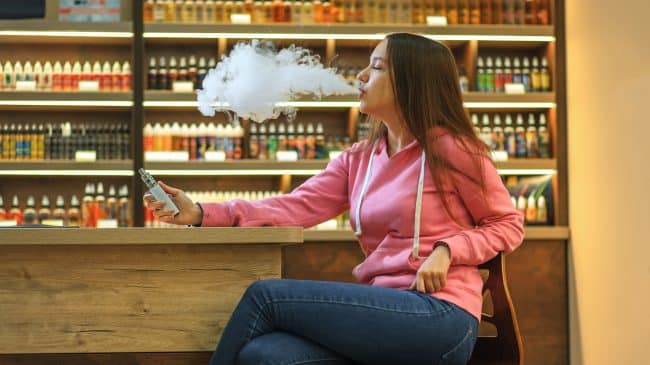The Trump administration’s decision to pull back from a total flavor ban of all vapor products, which it previously considered, is good news. Unfortunately, the administration’s new policy is still harmful to public health.
The Associated Press reports on the details of today’s announcement:
U.S. health officials will ban most flavored e-cigarettes popular with underage teenagers, but with major exceptions that benefit vaping manufacturers, retailers and adults who use the nicotine-emitting devices.
The Trump administration announced Thursday that it will prohibit fruit, candy, mint and dessert flavors from small, cartridge-based e-cigarettes that are popular with high school students. But menthol and tobacco-flavored e-cigarettes will be allowed to remain on the market.
The flavor ban will also entirely exempt large, tank-based vaping devices, which are primarily sold in vape shops that cater to adult smokers.
Pod-based and other closed-system e-cigarettes are a fantastic innovation helping many Americans quit cigarettes for good. Withdrawing non-tobacco and mint-flavored products, which are overwhelmingly the most popular choice among adult vapers, means smokers will have fewer opportunities to quit and represents yet another advantage for traditional cigarettes.
Juul, the largest e-cigarette company in the country, has already withdrawn its fruit and sweet flavors from the market so this measure is likely to give Juul a competitive advantage over its rival companies.
The Trump administration’s decision can’t be based on data. In fact, the arguments made against vaping products in recent months have been thoroughly debunked by the federal government’s own data. The tragic outbreak of lung illnesses and deaths caused by vaping black market THC products has frequently been conflated, by public health and government officials, with the use of legal nicotine e-cigarettes.
As Jacob James Rich and Jeffrey A. Miron wrote at Reason.com, “In fact, despite the disproportionate popularity of nicotine vaporizers, of the 1,782 hospitalized patients who were asked what type of product they were using, 80 percent reported use of vaporizers containing THC, the main psychoactive ingredient in marijuana. And due to marijuana’s illegality, this figure is likely an underestimate, as patients are likely underreporting THC use to avoid potential prosecution.”
Similarly, the claim that vaping is a gateway to smoking has not been borne out by the evidence and recently released data from the Centers for Disease Control and Prevention (CDC) shows that curiosity, not flavors, are the key driver of increases in youth vaping.
Nevertheless, the public is now more misinformed about the risks of e-cigarettes than they were several years ago, with a majority now incorrectly believing e-cigarettes are just as, or more, harmful than regular cigarettes.
To add insult to injury, while many public health groups were arguing for total e-cigarette prohibition, the Food and Drug Administration (FDA) recently approved the sale of two new combustible cigarettes.
Everyone agrees more could be done to tackle youth vaping. But the Trump administration and public health groups shouldn’t ignore the fact that millions of adult smokers have ditched cigarettes thanks to vaping and that youth smoking has fallen to a historic low at precisely the same that vaping has become popular.
The temporary stay of execution for open-system vapor products is of little long-term comfort. In May, all e-cigarette producers need to file pre-market tobacco product applications (PMTAs) with the FDA. These product applications are costly and many small businesses and independent companies are not going to be able to afford to comply with them. Thus, instead of prohibition by decree, many parts of the vaping industry are now facing prohibition via massive regulatory barriers.
Unless the deadline for the PMTAs is extended or there is an immediate overhaul of the regulatory process, the only e-cigarettes left in America later this year could be the ones sold in traditional tobacco flavors by traditional tobacco companies.
In today’s climate of fear and misinformation about vaping—a climate partially created by those who claim to be protectors the public health— the e-cigarette, the greatest competitor that the tobacco cigarette has ever faced, is now looking at virtual elimination. So while Trump’s policy isn’t the worst possible outcome it’s still a terrible blow for public health.

